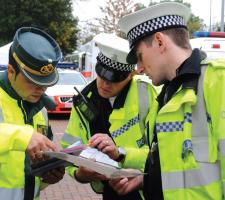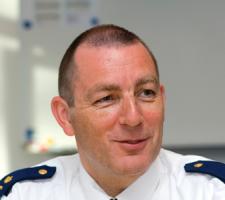
TISPOL's Peter van de Beek questions whether the thought processes which drive enforcement technology development are always the right ones
Peter van de Beek sees an ever-greater role for technology in traffic enforcement but is concerned that the emphasis of technological development and discussion is not always in the right places. 'Old-fashioned' face-to-face policing remains as valid as it ever did, he feels, but adds that there should be greater communication with those engaged at the sharp end of safety and enforcement.
"As policemen, we try to stop a driver immediately after they have committed an offence or driven badly," says van de Beek, who is a member of the Council and Executive Committee of
"There's a lot of merit in being able to immediately confront a situation, talk about it and then if necessary punish the offender. But that's not always possible. In some countries, automated enforcement improves the subjective chance of getting caught and TISPOL advocates the use of more automated systems - but to complement, not replace. The emphasis should still be on intelligence-led operations, the targeting of accident and incident black-spots and so on.
"Automated enforcement will always run the risk of 'Big Brother syndrome' but I think we need to achieve a better balance. As I see it, there are the 'Three Es' to consider: Engineering, Education and Enforcement. Engineers all too often only consider enforcement right at the very end of a development process, and yet there's a lot to be learned from the front-end practitioners. That's where I see TISPOL stepping in: as well as promoting best practice across European police forces and influencing policy development at the
Addressing safety
TISPOL
TISPOL is a Non-Governmental Organisation (NGO) part-funded by the European Commission which looks to influence policy on road safety at the European level and to promote best practice across European police forces. It does this in a variety of different ways, including organising exchange visits between different forces. Each year, TISPOL coordinates a number of week-long operations which focus on enforcement of specific road traffic rules. Recent examples include seatbelt wearing, speeding, alcohol and drug abuse, truck and coach safety.
"The black boxes which have actually made our vehicles safer also make the enforcement officer's job harder. Some 20 or 30 years ago, things were all-mechanical. Now, vehicles carry a wide range of increasingly sophisticated electronic systems which augment stability and safety. Cars have become safer.
Europe, like other regions in the world, has engaged in major projects to research the viability of cooperative infrastructures. Here again, van de Beek says that there is a need for better dialogue: "From the point of view of enforcement, engineers need to be talking to the police to learn how they feel such systems are going to affect driver behaviour.
"I've been to ITS congresses. Enforcement is almost off the agenda. But it always strikes me as strange that we continue to discuss enforcement. I ask you, why do we need enforcement when it is technically possible to forbid driving above posted speed limits? Why do we continue to sell cars that can do 300km/h? All they do is cause pain, and cost money and lives.
"Of course, we can engineer roads and vehicles but we can't do the same to driver behaviour - and that's where you need enforcement. But there is an acceptance issue. People are happy to accept all forms of technology which they perceive as helping them - route guidance and so forth - but they rail against enforcement.
True cost
"The truth is that freedom has a price. The citizens of every civilised country should be aware that they enjoy lots of freedoms. But they also need to accept that there are boundaries. Society bears the brunt of bad driving. When people exert their 'personal freedoms' and their 'right' to, for instance, drive without a seatbelt it's not the individual who bears the cost of ongoing and often extremely expensive healthcare when it all goes wrong. It's the taxpayer. Laws are made to regulate society, not necessarily to punish. They're also there to protect people."Transport networks are there for everyone, not just those concerned with personal freedoms. It's the age-old balance of fear and trust - fear of being caught doing something wrong and having to pay for the consequences, and trust in the governmental system to get things right. It's for governments to make law, industry to make safer products and scientists to consider the consequences. ITS's role is to bring all those people together.
"But influencing the development of technology is a long process - there are already a lot of automated systems available. What we try to do is advise on use in different countries. At the European level, that entails working towards having the same legislation across Member States - the same legal blood alcohol levels and standardised equipment, for instance.
"Looking forward, what we need is more of a chain approach - something which involves all of the different stakeholders. There are still obstacles to the development of new things, especially when it comes to in-car systems.
"Privacy is another area where people are sometimes not realistic. There are a lot of hang-ups when it comes to enforcement and privacy. It's already ridiculously easy to track people: debit and credit card purchases involve us giving away huge amounts of information and we do so freely, for instance. Yet when it comes to enforcement we suddenly seem to become squeamish. There's an ongoing issue of trust when it comes to the motives of the police and authorities which needs to be addressed.
"That becomes increasingly absurd when one looks at the amount of information which people post on social networking sites such as Facebook and Twitter. There's actually quite a danger attached to that, especially for young people, in that posting something which is ill-advised - films on Youtube, for instance - can have big influences on life later.
"There's a certain irony here, especially as when individuals' right to exercise freedom go wrong, they tend to look to the state for protection. We need to think more about how in the future privacy can be incorporated into new technologies from the start. That way, a challenge is removed before it ever has the chance to arise."
Cross-fertilisation of ideas
TISPOL, through its three-year Lifesaver project, recently organised for traffic police officers from five European countries to visit the UK and spend time with various country police forces. A 10-strong contingent of officers from Poland were guests of North Yorkshire Police, while five Romanians were in South Yorkshire, four more Poles in West Yorkshire, five Romanians in Humberside, three Slovenians in Sussex, three more Slovenians in Hampshire, 10 Hungarians in Devon and Cornwall, and five Spanish officers with the Metropolitan Police.
Hosting police forces put together busy programmes, allowing their visitors to observe various roads policing tactics and techniques which they could then take back and use - if appropriate - in their own countries.
For example, the Slovenian officers in Hampshire took part in a day of checks with their Hamphsire hosts at Rownhams Services on the M27 motorway, while Polish officers in North Yorkshire assisted in a truck check at Scotch Corner, the junction of the A1 and A66.
The Lifesaver project, part-funded by the EC, began in June 2008 and will run until the end of May, 2011. It focuses on six member states (Hungary, Poland, Portugal, Romania, Slovenia and Spain) to assist them in their road traffic enforcement work to save lives. The project aims at an integrated approach to saving lives on Europe's roads. All three relevant levels of policing, the strategic, tactical and operational, are addressed.
TISPOL General Secretary Ian Hamill: "Exchanges offer the opportunity for police officers to visit and observe activities taking place which have been found to improve road safety in a particular country. The officers themselves benefit greatly from seeing this at first hand, are able to engage with colleagues on the ground and go back to their own police force and share their knowledge and experiences.
"They can advocate, through their own hierarchy, for similar measures to be introduced in their own country. We have seen this specifically with penalty points, drug-driving, automated speeding and automatic number plate recognition. The feedback we have received has been very positive."













